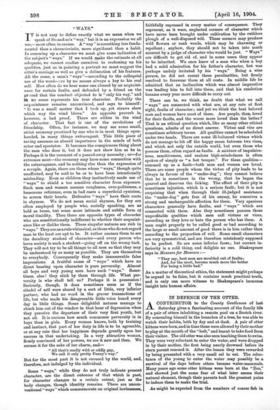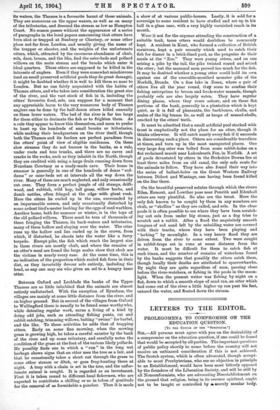its waters, the Thames is a favourite haunt of these
animals. They are numerous on the upper waters, as well as on many of the tributaries, and descend the stream as low as Hampton Court, No season passes without the appearance of a series of paragraphs in the local papers announcing that otters have been shot or trapped at Sunbury or Chertsey, or some other place not far from London, and usually giving the name of the trapper or shooter, and the weights of the unfortunate otters, which, attracted by the enormous abundance of chub, eels, dace, bream, and the like, find the osier-beds and pollard willows on the main stream and the brooks which enter it ideal quarters. These otters are supposed to be killed in the interests of anglers. Even if they were somewhat mischievous (and on small preserved artificial pools they do great damage), it might be doubted whether it is well to kill them so near to London. But no one fairly acquainted with the habits of Thames otters, and who takes into consideration the great size of the river, and the vast stock of fish in it, including the otters' favourite food, eels, can suppose for a moment that any appreciable harm to the very numerous body of Thames anglers can be done by the half-dozen otters killed annually on these lower waters. The bed of the river is far too large for them either to decimate the fish or to frighten them. As a role they appear to know this themselves, and seem to prefer to hunt up the hundreds of small brooks or tributaries, while making their headquarters on the river itself, though both the Thames and its feeders are perfect paradises from the otters' point of view of eligible residences. On these slow streams they do not burrow in the banks, as a rule, under roots and tree trunks, and there are no caves and cracks in the rocks, such as they inhabit in the North, though they are credited with using a large drain running down from Nuneham Courtney as a ready-made cave. Their home in summer is generally in one of the hundreds of dense " rod- dams " or osier-beds set at intervals all the way down the river. Many of these are much neglected, and only occasionally cut over. They form a perfect jungle of old stumps, drift- wood, and rubbish, wild hop, tall grass, willow herbs, and dumb nettles, often fringed at the edge with giant rush. Here the otters lie curled up in the sun, surrounded by an impermeable screen, and only occasionally disturbed by some ardent bird's-nester looking for the eggs of reed warble's. Another home, both for summer or winter, is in the tops of the old pollard willows. There must be tens of thousands of these fringing the Thames, its back-waters and tributaries, many of them hollow and sloping over the water. The otter runs up the hollow and lies curled up in the crown, from which, if disturbed, he shoots into the water like a furry. torpedo. Except pike, the fish which reach the largest size in these rivers are mostly chub, and where the remains of an otter's meal are found the large scales show that chub are the victims in nearly every case. At the same time, this is no indication of the proportion which scaled fish form in their diet, as they invariably devour eels entirely, including the head, as any one may see who gives an eel to a hungry tame otter.
Between Oxford and Lechlade the banks of the Upper Thames are so little inhabited that the animals are almost entirely undisturbed. With the exception of Eynsham, the villages are mainly at some little distance from the river, and on higher ground. But in several of the villages from Oxford to Wallingford there is usually to be found some worthy who, while detesting regular work, earns a living of a kind by doing odd jobs, such as attending fishing punts, rat and rabbit catching, trimming willows, baiting "swims" for barbel, and the like. To these activities he adds that of trapping otters. Early on some fine morning, when the mowing grass is growing high, he takes a careful saunter by the bank of the river and up some tributary, and carefully notes the condition of the grass at the foot of the various likely pollards. He possibly finds one in which a "run" in the long wet herbage shows signs that an otter uses the tree as a lair, and that he occasionally takes a short cut through the grass to some other stream or ditch, or goes frog-hunting there at night. A trap with a chain is set in the tree, and the unfor- tunate animal is caught. It is regarded as an investment. First it is taken round to different local fishermen, who are expected to contribute a shilling or so in token of gratitude for the removal of so formidable a poacher. Then it is made
Were it not for the expense attending the construction of a suitable tank, tame otters would doubtless be commonly kept. A resident in Kent, who formed a collection of British carnivore, kept a pair recently which used to catch their fish for dinner in a brick-lined pool, as the penguins do their meals at the "Zoo." They were young otters, and on one seizing a pike by the tail, the pike twisted round and seized the otter; but the mammal soon proved too much for the fish. It may be doubted whether a young otter could hold its own against one of the crocodile-mouthed monster pike of the Norfolk, Broads. On a fine lake in Essex, where a pair of otters live all the year round, they seem to confine their fishing enterprises to bream and fresh-water mussels, though probably eels are also largely eaten. They have regular dining places, where they come ashore, and on these flat portions of the bank, generally in a plantation which is kept quiet, as it is full of pheasants, the backbones, skulls, and scales of the big bream lie, as well as heaps of mussel-shells, cracked by the otters' teeth.
It must be admitted that a small artificial pool stocked with trout is emphatically not the place for an otter, though it thinks otherwise. It will catch nearly every fish if it succeeds in discovering such a place. Otters are considerable travellers at times, and turn up in the most unexpected places. One very large dog otter was bolted from some rabbit-holes on a flat reclaimed marsh near Lakenheath Fen, in Norfolk. A set of pools devastated by otters in the Berkshire Downs lies at least three miles from an old canal, the only safe route for the animals to follow. They have also found their way into the series of ballast-holes on the Great Western Railway between Didcot and Wantage, one having been found killed on the line there.
On the beautiful preserved estates through which the rivers Eden, Eamont, and Lowther pass near Penrith and Edenhall otters are very plentiful. So also are the trout. Here the only fish known to be caught by them in any numbers are chub, or " skellies " as they are called, and eels. In the clear pools it is often possible to see where they have been scratch. lug out eels from under big stones, just as a dog tries to scratch out a rabbit. After a flood the exquisitely smooth tongues of red sand left by the subsiding water are covered with their tracks, where they have been playing and " larking" by moonlight. In a very heavy flood they are driven from the river to some extent. Two were caught in rabbit-traps set in rune at some distance from the water. It must be difficult for them to catch fish at such times, and the number of remains of waterhens found by the banks suggests that possibly the otters catch them, though locally their deaths are attributed to eparrowhawke. By night they are quite regardless of man, passing close before the river-watchers, or fishing in the pools in the moon- light. When the present writer was fishing by night on a flat, down to which a smooth slope of sand ran, an otter which had come out of the river a little higher up ran past his feet, entered the water, and floated down the stream.
LETTERS TO THE EDITOR.
PROLEGOMENA TO COMPROMISE ON THE EDUCATION QUESTION.
pro THE Enrroe or rev ..Srrouro..1
Sut,—All persons must agree with you on the desirability of a compromise on the education question, if one could be found that would be accepted by all parties. The important questions of public policy shortly to come before the country will not receive an unbiassed consideration if this is not achieved. The Scotch system, which is often advocated, though accept- able to most Presbyterians, who see no objection in principle to an Establishment, would have been most bitterly opposed by the founders of the Liberation Society, and will be still by all Nonconformists, who are advocating Disestablishment on the ground that religion, being in its essence spiritual, ought not to be taught or controlled by se ;merely secular body.







































 Previous page
Previous page